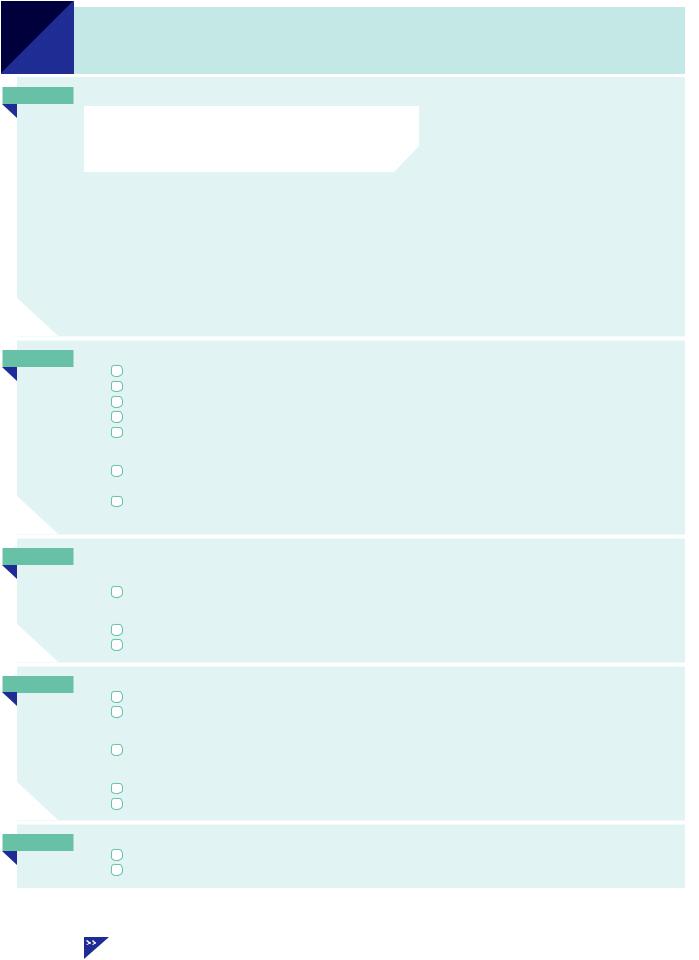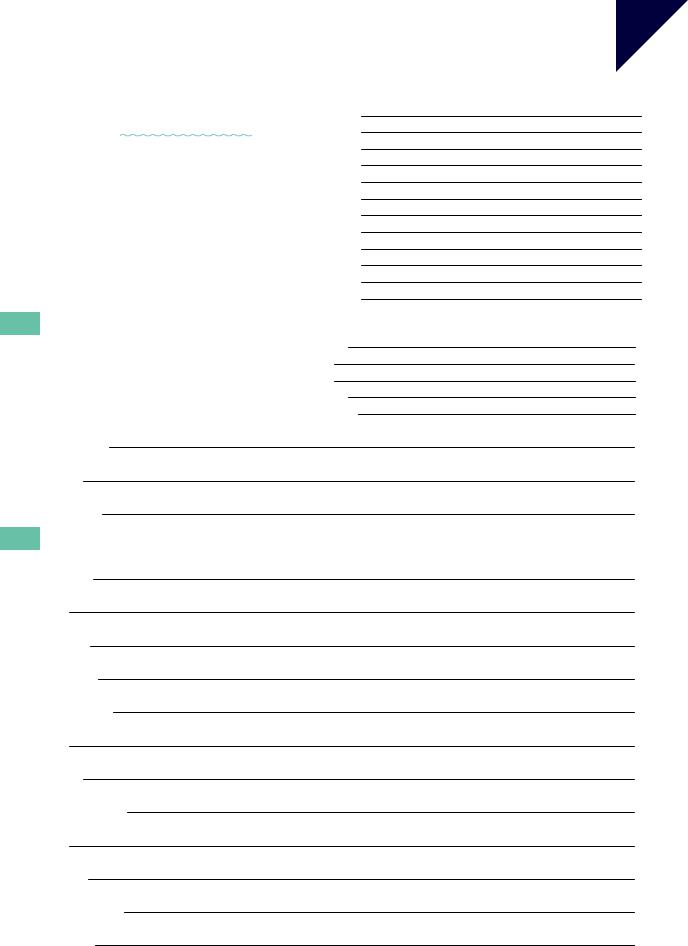
- •Contents
- •Thanks
- •To the student
- •To the teacher
- •3 Present continuous and present simple 1 (I am doing and I do)
- •10 Present perfect continuous and simple (I have been doing and I have done)
- •11 how long have you (been) … ?
- •12 for and since when … ? and how long … ?
- •13 Present perfect and past 1 (I have done and I did)
- •14 Present perfect and past 2 (I have done and I did)
- •15 Past perfect (I had done)
- •16 Past perfect continuous (I had been doing)
- •17 have and have got
- •18 used to (do)
- •19 Present tenses (I am doing / I do) for the future
- •20 I’m going to (do)
- •21 will and shall 1
- •22 will and shall 2
- •23 I will and I’m going to
- •24 will be doing and will have done
- •26 can, could and (be) able to
- •27 could (do) and could have (done)
- •28 must and can’t
- •29 may and might 1
- •30 may and might 2
- •31 have to and must
- •32 must mustn’t needn’t
- •33 should 1
- •34 should 2
- •35 I’d better … it’s time …
- •36 would
- •39 if I knew … I wish I knew …
- •40 if I had known … I wish I had known …
- •41 wish
- •42 Passive 1 (is done / was done)
- •43 Passive 2 (be done / been done / being done)
- •44 Passive 3
- •45 it is said that … he is said to … he is supposed to …
- •46 have something done
- •47 Reported speech 1 (he said that …)
- •48 Reported speech 2
- •49 Questions 1
- •52 Question tags (do you? isn’t it? etc.)
- •53 Verb + -ing (enjoy doing / stop doing etc.)
- •54 Verb + to … (decide to … / forget to … etc.)
- •55 Verb (+ object) + to … (I want you to …)
- •56 Verb + -ing or to … 1 (remember, regret etc.)
- •57 Verb + -ing or to … 2 (try, need, help)
- •58 Verb + -ing or to … 3 (like / would like etc.)
- •59 prefer and would rather
- •60 Preposition (in/for/about etc.) + -ing
- •61 be/get used to … (I’m used to …)
- •63 there’s no point in -ing, it’s worth -ing etc.
- •64 to … , for … and so that …
- •65 Adjective + to …
- •66 to … (afraid to do) and preposition + -ing (afraid of -ing)
- •67 see somebody do and see somebody doing
- •68 -ing clauses (He hurt his knee playing football.)
- •69 Countable and uncountable 1
- •70 Countable and uncountable 2
- •71 Countable nouns with a/an and some
- •74 the 2 (school / the school etc.)
- •75 the 3 (children / the children)
- •77 Names with and without the 1
- •78 Names with and without the 2
- •79 Singular and plural
- •80 Noun + noun (a bus driver / a headache)
- •81 -’s (your sister’s name) and of … (the name of the book)
- •82 myself/yourself/themselves etc.
- •83 a friend of mine my own house on my own / by myself
- •84 there … and it …
- •85 some and any
- •87 much, many, little, few, a lot, plenty
- •90 all every whole
- •91 each and every
- •92 Relative clauses 1: clauses with who/that/which
- •94 Relative clauses 3: whose/whom/where
- •95 Relative clauses 4: extra information clauses (1)
- •96 Relative clauses 5: extra information clauses (2)
- •97 -ing and -ed clauses (the woman talking to Tom, the boy injured in the accident)
- •98 Adjectives ending in -ing and -ed (boring/bored etc.)
- •99 Adjectives: a nice new house, you look tired
- •100 Adjectives and adverbs 1 (quick/quickly)
- •102 so and such
- •104 quite, pretty, rather and fairly
- •105 Comparative 1 (cheaper, more expensive etc.)
- •106 Comparative 2 (much better / any better etc.)
- •107 Comparative 3 (as … as / than)
- •108 Superlative (the longest / the most enjoyable etc.)
- •109 Word order 1: verb + object; place and time
- •110 Word order 2: adverbs with the verb
- •111 still any more yet already
- •112 even
- •114 in case
- •116 as (as I walked … / as I was … etc.)
- •117 like and as
- •119 during for while
- •121 at/on/in (time)
- •122 on time and in time at the end and in the end
- •123 in/at/on (position) 1
- •124 in/at/on (position) 2
- •125 in/at/on (position) 3
- •126 to, at, in and into
- •127 in/on/at (other uses)
- •129 Noun + preposition (reason for, cause of etc.)
- •130 Adjective + preposition 1
- •131 Adjective + preposition 2
- •132 Verb + preposition 1 to and at
- •134 Verb + preposition 3 about and of
- •135 Verb + preposition 4 of/for/from/on
- •136 Verb + preposition 5 in/into/with/to/on
- •137 Phrasal verbs 1 Introduction
- •138 Phrasal verbs 2 in/out
- •139 Phrasal verbs 3 out
- •142 Phrasal verbs 6 up/down
- •143 Phrasal verbs 7 up (1)
- •144 Phrasal verbs 8 up (2)
- •145 Phrasal verbs 9 away/back
- •Additional exercises
- •Study guide
- •Key to Exercises
- •Key to Additional exercises (see page 302)
- •Key to Study guide
- •Index

Unit
108 Superlative (the longest / the most enjoyable etc.)
ALook at these examples:
What is the longest river in the world?
What was the most enjoyable holiday you’ve ever had?
Longest and most enjoyable are superlative forms.
The superlative form is -est or most … . In general, we use -est for short words and most … for longer words.
long → longest |
hot → hottest |
easy → easiest |
hard → hardest |
but most famous |
most boring |
most enjoyable |
most dificult |
A few superlative forms are irregular: |
|
|
|
good → best |
bad → worst |
far → furthest or farthest |
|
The rules are the same as those for the comparative – see Unit 105.
For spelling, see Appendix 6.
BWe normally use the (or my/your etc.) with a superlative:
Yesterday was the hottest day of the year.
The Louvre in Paris is one of the most famous museums in the world.
She is really nice – one of the nicest people I know.
What’s the best movie you’ve ever seen, and what’s the worst?
How old is your youngest child?
Compare the superlative and the comparative:
This hotel is the cheapest in town. (superlative)
It’s cheaper than all the others in town. (comparative)
He’s the most patient person I’ve ever met.
He’s much more patient than I am.
Coldest and eldest
The superlative of old is oldest:
That church is the oldest building in the town. (not the eldest)
We use eldest only when we talk about people in a family (you can also use oldest):
Their eldest son is 13 years old. (or Their oldest son)
Are you the eldest in your family? (or the oldest)
DAter superlatives we normally use in with places:
What’s the longest river in the world? (not of the world)
We had a nice room. It was one of the best in the hotel. (not of the hotel)
We also use in for organisations and groups of people (a class / a company etc.):
Who is the youngest student in the class? (not of the class)
For a period of time (day, year etc.), we normally use of:
Yesterday was the hottest day of the year.
What was the happiest day of your life?
EWe oten use the present perfect (I have done) ater a superlative (see also Unit 8A):
What’s the most important decision you’ve ever made?
That was the best holiday I’ve had for a long time.
216 |
Comparative (cheaper / more expensive etc.) Units 105–107 elder Unit 106E |

Exercises |
|
|
|
|
|
|
Unit |
|||
|
|
|
|
|
|
108 |
||||
|
|
|
||||||||
|
||||||||||
108.1 |
Complete the sentences. Use the superlative forms (-est or most …) of the words in the box. |
|||||||||
|
|
bad |
cheap |
good |
honest |
popular |
short |
tall |
||
1 |
We didn’t have much money, so we stayed at |
the cheapest hotel in the town. |
||||||||
2 |
This building is 250 metres high, but it’s not |
|
|
in the city. |
||||||
3 |
It was an awful day. It was |
|
|
|
|
day of my life. |
||||
4 |
What is |
|
|
|
|
|
|
sport in your country? |
||
5 |
I like the morning. For me it’s |
|
|
|
part of the day. |
|||||
6 |
Sarah always tells the truth. She’s one of |
|
|
|
people I know. |
|||||
7 |
A straight line is |
|
|
|
|
distance between two points. |
||||
|
||||||||||
108.2 |
Complete the sentences. Use a superlative (-est or most …) or a comparative (-er or more …). |
|||||||||
1 |
We stayed at |
the cheapest hotel in the town. (cheap) |
|
|
||||||
2 |
Our hotel was |
cheaper |
than all the others in the town. (cheap) |
|
|
|||||
3 |
I wasn’t feeling well yesterday, but I feel a bit |
|
|
today. (good) |
||||||
4 |
What’s |
|
|
|
|
thing you’ve ever bought? (expensive) |
||||
5 |
I prefer this chair to the other one. It’s |
|
|
|
. (comfortable) |
|||||
6 |
Amy and Ben have three daughters. |
|
|
|
is 14 years old. (old) |
|||||
7 |
Who is the |
|
|
person you know? (old) |
||||||
8 |
What’s |
|
|
|
way to get to the station? |
(quick) |
||||
9 |
Which is |
|
|
– the bus or the train? (quick) |
||||||
10 |
I can remember when I was three years old. It’s |
|
|
memory. (early) |
||||||
11 |
Everest is |
|
mountain in the world. It is |
|
|
|||||
|
|
than any other mountain. (high) |
|
|
|
|
|
|||
12 |
a: This knife isn’t very sharp. Do you have a |
|
|
one? |
||||||
|
|
B: No, it’s |
|
|
one I have. (sharp) |
|
|
|||
|
||||||||||
108.3 |
Complete the sentences. Use a superlative (-est or most …) + a preposition (of or in). |
|||||||||
1 |
It’s a very good room. It’s |
the best room in |
the hotel. |
|
|
|||||
2 |
Brazil is a very large country. It’s |
|
|
|
South America. |
|||||
3 |
It was a very happy day. It was |
|
|
|
my life. |
|||||
4 |
This is a very valuable painting. It’s |
|
|
|
the museum. |
|||||
5 |
Spring is a very busy time for me. It’s |
|
|
|
the year. |
|||||
In the following sentences use one of + a superlative + a preposition.
6 |
It’s a very good room. It’s one of the best rooms in the hotel. |
|
|
7 |
He’s a very rich man. He’s one |
the country. |
|
8 |
She’s a very good student. She’s |
the class. |
|
9 |
It was a very bad experience. It was |
my life. |
|
10 |
It’s a very famous university. It’s |
the world. |
|
|
|
||
108.4 |
What do you say in these situations? Use a superlative + ever. |
|
|
1 |
You’ve just been to the cinema. The movie was extremely boring. You tell your friend: |
|
|
|
|
(boring / movie / ever / see) That’s the most boring movie I’ve ever seen |
. |
2 |
Someone has just told you a joke which you think is very funny. You say: |
|
|
|
|
(funny / joke / ever / hear) That’s |
. |
3 |
You’re drinking cofee with a friend. It’s really good cofee. You say: |
|
|
|
|
(good / cofee / ever / taste) This |
. |
4 |
You have just run ten kilometres. You’ve never run further than this. You say: |
|
|
|
|
(far / ever / run) That |
. |
5 |
You gave up your job. Now you think this was a very bad mistake. You say: |
|
|
|
|
(bad / mistake / ever / make) It |
. |
6 |
Your friend meets a lot of people, some of them famous. You ask your friend: |
|
|
|
|
(famous / person / ever / meet?) Who |
? |
217

Unit
109 Word order 1: verb + object; place and time
AVerb + object
The verb and the object normally go together. We do not usually put other words between them:
|
verb |
object |
|
|
I |
like |
my job |
very much. (not I like very much) |
|
Our guide |
spoke |
English |
fluently. |
(not spoke fluently English) |
I didn’t |
use |
my phone |
yesterday. |
|
Do you |
eat |
meat |
every day? |
|
|
|
|
|
|
Two more examples:
I lost all my money and I also lost my passport. (not I lost also my passport)
At the end of this street you’ll see a supermarket on your let. (not see on your let a supermarket)
BPlace
The verb and place (where?) normally go together:
go home |
live in a city |
walk to work etc. |
If the verb has an object, the order is:
verb |
object |
place |
We
Don’t
Did you
took |
the children |
to the zoo. (not took to the zoo the children) |
put |
anything |
on the table. |
learn |
English |
at school? |
CTime
Normally time (when? / how oten? / how long?) goes ater place:
|
place |
time |
Ben walks |
to work |
every morning. (not every morning to work) |
I’m going |
to Paris |
on Monday. |
They’ve lived |
in the same house |
for a long time. |
We need to be |
at the airport |
by 8 o’clock. |
Sarah gave me a lit |
home |
ater the party. |
You really shouldn’t go |
to bed |
so late. |
|
|
|
Sometimes we put time at the beginning of the sentence:
On Monday I’m going to Paris.
Ater the party Sarah gave me a lit home.
Some time words (for example, always/never/usually) go with the verb in the middle of the sentence. See Unit 110.
218 |
Word order in questions Units 49–50 Adjective order Unit 99 Word order 2 Unit 110 |

Exercises |
Unit |
|
109 |
||
|
|
|
|
|
|
109.1 |
Is the word order OK or not? Correct the sentences where necessary. |
|
|
|
|
1 Did you see your friends yesterday?
2 Ben walks every morning to work.
3 Joe doesn’t like very much football.
4 Dan won easily the race.
5 Tanya speaks German quite well.
6 Have you seen recently Chris?
7 I borrowed from a friend some money.
8 Please don’t ask that question again.
9 I ate quickly my breakfast and went out.
10Did you invite to the party a lot of people?
11Sam watches all the time TV.
12Does Kevin play football every weekend?
OK
Ben walks to work every morning.
109.2 Complete the sentences. Put the parts in the correct order.
1 |
We (the children / to the zoo / took). |
We took the children to the zoo |
. |
2 |
I (a friend of mine / on my way home / met). |
I |
. |
3 |
I (to put / on the envelope / a stamp / forgot). |
I |
. |
4 |
We (a lot of fruit / bought / in the market). |
We |
. |
5 |
They (opposite the park / a new hotel / built). |
They |
. |
6 |
Did you (at school / today / a lot of things / learn)? |
|
|
|
Did you |
|
? |
7 |
We (some interesting books / found / in the library). |
|
|
|
We |
|
. |
8 |
Please (at the top / write / of the page / your name). |
|
|
|
Please |
|
. |
109.3 Complete the sentences. Put the parts in the correct order.
1 |
They (for a long time / have lived / in the same house). |
|
|
They have lived in the same house for a long time |
. |
2 |
I (to the supermarket / every Friday / go). |
|
|
I |
. |
3 |
Why (home / did you come / so late)? |
|
|
Why |
? |
4 |
Sarah (her children / takes / every day / to school). |
|
|
Sarah |
. |
5 |
I haven’t (been / recently / to the cinema). |
|
|
I haven’t |
. |
6 |
I (her name / ater a few minutes / remembered). |
|
|
I |
. |
7 |
We (around the town / all morning / walked). |
|
|
We |
. |
8 |
My brother (has been / since April / in Canada). |
|
|
My brother |
. |
9 |
I (on Saturday night / didn’t see you / at the party). |
|
|
I |
. |
10 |
Lisa (her umbrella / last night / in a restaurant / let). |
|
|
Lisa |
. |
11 |
The moon (round the earth / every 27 days / goes). |
|
|
The moon |
. |
12 |
Anna (Italian / for the last three years / has been teaching / in London). |
|
|
Anna |
. |
219
